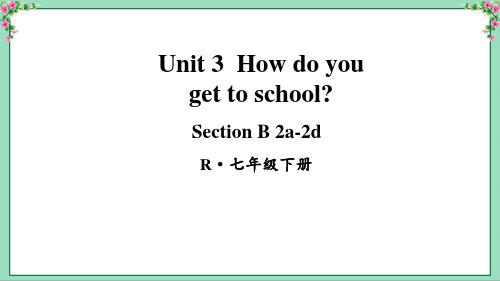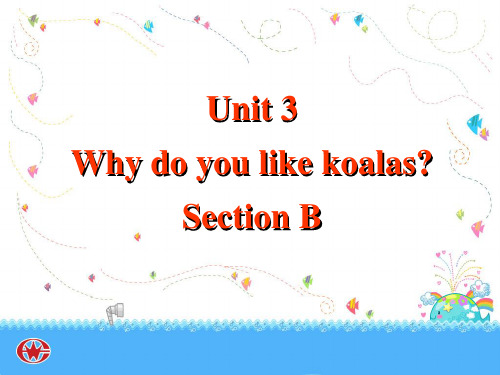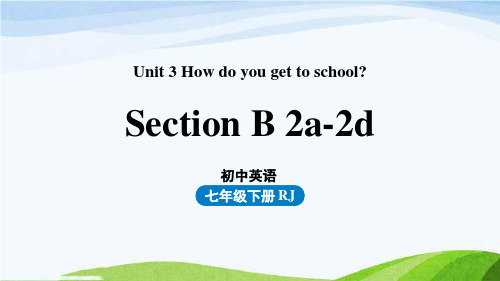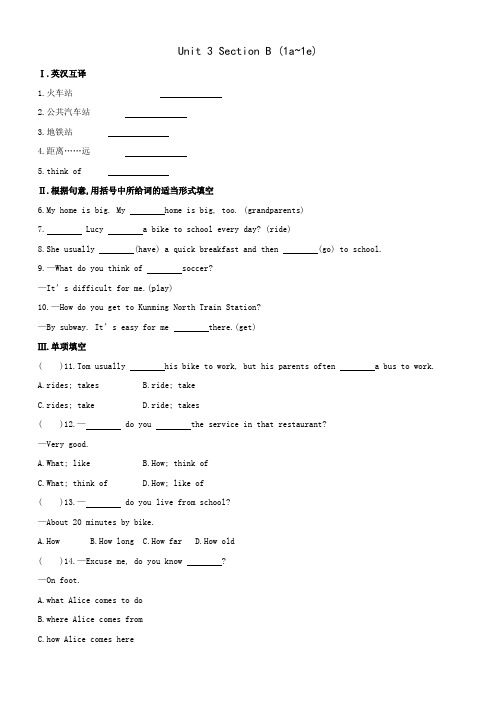人教版七年级英语下册Unit3sectionB
人教版英语七年级下册Unit 3 Section B(2a-2d)新版课件

Tips: First understand the questions, then find the answers in the text.
Read Para. 2 & Para. 3 and fill in the blanks.
to understand the general idea of the passage.
Look at the layout(布局)of the story and answer.
➢Where can you see the story? A. In a newspaper. B. In a magazine. C. In a book.
Careful-reading
Read Para. 1 and judge the sentences “T” or “F”.
T 1. For many students, it’s not hard to get to school. F 2. For the students in one small village in China, it’s
Tips: Sometimes, we can judge the type of article by its layout.
Fast-reading
Read the news story from some years 2b ago and choose the best title for it.
Learn to guess the main idea of the passage and talk about how to get to places.
人教版初中英语七年级下册Unit 3 Section B名师课件(三课时)

Practice
A: How does he get to school? B: First, he ...
Then he ...
Practice
A: How does he get to school? B: First, he rides a bike to the subway station.
Their dream is to have a bridge. I think their dream can come true. Maybe the government can build a bridge for them.
1. For the students in the village, itdifsfic_u_lt_______ to get to school. It is (not)+ adj. + to do sth.
For example
A: How do you get to school? B: First, I ...
Then I …
Practice
A: How does he get to work? B: First, he walks to the bus stop.
Then he takes a bus to work.
Review How do you get to school? How long does it take?
18 minutes
I take a taxi to school. I get to school by taxi. It takes about 18 minutes.
人教版七年级英语下unit3SectionB

Section B
3a Read the description and match them with the animals.
Molly This is Molly. She is
twelve years old. She is from Africa. She likes to play with her friends and eat grass.
fruit. 改为eat或to climb → climbing 8. Penguins from the South Pole.
前面加are或come 9. —What do you like elephants? Why
—Because they are friendly. 10. We can see many animal in the zoo.
5. The music sounds r_e_l_a_x_in_g_ (relax).
Ⅲ. 根据短文及首字母提示, 补全单词。
This is Larry. He’s (1) f _r_o_m_ Africa. He’s six (2) y____ eoaldr.sHe is (3)l___ . Hazey usually (4)s_le_e_p_s20 hours every day. He likes (5)e_a_ti_n_g_ meat, and he likes to (6)p_la_y_ with his friends. He’s kind of popular in the (7)z_o_o_. Many people like this interesting (8)a_n_im__a_l_.
人教版七下英语Unit3第4课时(SectionB 2a-2d)

Role-play the conversation in 2c. Reporter: How do you go to school, Liangliang? Liangliang: I go on a ropeway to cross the river to school. Reporter: Are you afraid? Liangliang: No, I’m not. Because I love my school and my teachers. I like to play with my classmates at school. Reporter: Is it difficult for you to go to school? Liangliang: Yes, it is. Reporter: Do you want to have a bridge? Liangliang: Yes. It’s our dream. Reporter: I’m sure your dream can come true.
A. How to Get to School √B. Crossing the River to School C. Going to School Is Fun
Read the story again and answer the questions. 1. How do the students in the village go to school?
•for many students, walk/ride a bike/ by bus/ by train •for the students in one small village in China, it is difficult (过渡句) •a very big river, no bridge, the river runs too quickly,
人教版英语七年级下册Unit3 SectionB 教材知识详解

Unit3 SectionB 教材知识详解1. Mary wants to know what he thinks of the trip.玛丽想知道他认为这段旅程怎么样。
(1)这是一个含有what引导的宾语从句的主从复合句,主句的主语是Mary,谓语是wants to know,宾语是一个特殊疑问句,原句应为“What does he think of the trip?”,但在宾语从句中,从句的语序要用陈述语序,其中疑问词仍在句首,位置不变;另外,宾语从句的时态与主句的时态要一致。
如:I know where you live.我知道你住在哪儿。
Thomas wants to know how she gets to school.托马斯想知道她怎样到学校。
(2) think of意为“认为;考虑”。
of为介词,其后可接名词、代词或动名词作宾语,在表示“认为……怎么样”时,可与think about互换。
如:—What do you think of/about the school trip?你认为这次学校郊游怎么样?一It’s great.非常好。
What do you think of...?意为“你认为……怎么样?”,可与How do you like...?进行转换,这是用来询问某人对某事或某人的看法的常用句型。
如:What do you think of action movies?=How do you like action movies?你认为动作片怎么样?2. Crossing the River to School过河去学校cross(1)动词,意为“越过;穿过”,主要指“横穿”。
如:The little boy can’t cross the street by himself.这个小男孩不能独自过马路。
(2)名词,意为“十字形,叉形记号”。
如:The teacher marked the question with a cross.老师在这个问题上打了一个叉。
word完整版人教版初中英语七年级下册Unit3SectionB教材全解

人教版初中英语七年级下册Unit3SectionB教材全解Unit 3 How do you get to school?Unit 3 Section B教材全解1.bus stop 公共汽车站【重点注释】stop,此处用作名词,意为“车站;站点”。
例如:at a/the bus stop 在公共汽车站。
stop一般指的是小站,停车点,如路边的停车站点;station指的是总站,大型的车站,at a bus/train/subway station。
例如:They wait for Jim at the bus stop.他们在公共汽车站等吉姆。
Where si the bus station?公共汽车站在哪儿?例句:Let's stop to have a rest.让我们停下来(原来干的事),(再去)休息一下吧。
Stop talking,please.请停止(正在)说话(这个事)。
They stop to smoke a cigarette.他们停下来(原来干的事),(然后)抽了根烟。
I must stop smoking.我必须戒烟了(我必须停止正在抽烟这个事)。
2.Mary wants to know where Bob lives.玛丽想知道鲍勃住在哪儿。
Mary wants to know what he thinks of the trip.玛丽想知道他(鲍勃)认为这段旅程怎么样。
【重点注释】①Mary wants to know where Bob lives.玛丽想知道鲍勃住在哪儿。
本句含有一个由连接词where引导的宾语从句。
在复合句中用作宾语的从句叫宾语从句。
无论主句是陈述句还是疑问句,宾语从句都必须使用陈述语序,即“主句+连词+宾语从句(主语+谓语+……)”句式。
如果主句的谓语动词是一般现在时,从句的谓语动词可根据需要,选用相应的任何时态。
例如:Please tell me whoknows the answer.请告诉我谁知道答案。
人教新目标七年级英语下册:Unit 3 Section B 达标练习题附答案

Unit 3 Section B (1a~1e)Ⅰ.英汉互译1.火车站2.公共汽车站3.地铁站4.距离……远5.think ofⅡ.根据句意,用括号中所给词的适当形式填空6.My home is big. My home is big, too. (grandparents)7. Lucy a bike to school every day? (ride)8.She usually (have) a quick breakfast and then (go) to school.9.—What do you think of soccer?—It’s difficult for me.(play)10.—How do you get to Kunming North Train Station?—By subway. It’s easy for me there.(get)Ⅲ.单项填空( )11.Tom usually his bike to work, but his parents often a bus to work.A.rides; takesB.ride; takeC.rides; takeD.ride; takes( )12.— do you the service in that restaurant?—Very good.A.What; likeB.How; think ofC.What; think ofD.How; like of( )13.— do you live from school?—About 20 minutes by bike.A.HowB.How longC.How farD.How old( )14.—Excuse me, do you know ?—On foot.A.what Alice comes to doB.where Alice comes fromC.how Alice comes hereD.how does Alice come here( )15.It me fifteen minutes the park.A.takes; get toB.takes; to get toC.take; to get toD.take; get to( )16.— does it take you to finish your homework every day?—About two hours.A.How farB.How longC.How muchD.How manyⅣ.按要求完成下列各题17.Jane goes to school by subway.(改为一般疑问句)Jane to school by subway?18.It’s thirty minutes’ walk from the post office to my home.(对画线部分提问)is it from the post office to your home?19.It takes her half a day to draw this picture.(对画线部分提问)does it take her to draw this picture?20.Mr. Miller usually walks to the supermarket.(改为同义句)Mr. Miller usually goes to the supermarket .21.I often spend an hour getting there.(改为同义句)It often me an hour get there.Ⅴ.根据短文内容,从方框中选择恰当的单词并用其适当形式填空brush, get, after, ask, job,she, with, never, make, butRita is a nice girl. She has an interesting 22. . She works at a radio station. She is busy 23. happy every day. In the morning she 24. up early. First she helps her mother 25. breakfast. Then she 26. her teeth and eats breakfast. 27. that she goes to work. Rita is 28. late for work. She likes 29. job. And she is good 30. her workmates(同事) at the radio station. After work, her workmates often 31. her to have dinner with them. But Rita likes to get home early and have dinner with her parents.答案Ⅰ.1.train station2. bus station/bus stop3. subway station4. far from5.认为;想起Ⅱ.6.grandparents’7. Does; ride8. has; goes9. playing10.to getⅢ.11.C 考查主谓一致。
人教七年级下册英语Unit3SectionB同步练习(含解析)

Unit3Section B基础闯关全练I.根据句意和汉语提示写出所缺的单词1.Look at the(桥)over there.lt is very beautiful.2.One day my(梦想)will come true.3.The little girl is(害怕)of dogs.4.There is a(河)near here.5.1can see some(小船)on the coast.There will be a high-speed railway,(在...之间)Ningbo and Zhoushan. 6.II.用括号中所给词的适当形式填空1.The(village)dreams to leave the village to work in the big city.2.Be careful when you go(cross)the street.3.It's very easy(find)some useful information on the Internet.4.He doesn't want to tell me the(true).5.It usually takes me ten minutes(ride)to school.III.单项选择1.()John likes to sit between his father his mother.A.andB.orC.atD.in2.()It's very dangerous for us the mobile phone while crossing the street.A.answeringB.to answerC.answer3.()1have homework to do and Julie has books to read.A.much;manyB.many;manyC.many;muchD.much;much4.()It takes ten minutes his homework.A.his;doB.him;to doC.his;doingD.him;do5.()It's the old man's dream to go to Beijing.Can his dream?A.go outB.eat oute truee on6.()Susan,is important to practice speaking English after class.A.itB.oneC.thatD.this7.()It's hard for us to say goodbye we have so many happy days to remember.A.soB.becauseC.althoughD.until能力提升全练I.根据汉语意思完成句子,每空一词1.如果你足够努力,梦想就会实现。
- 1、下载文档前请自行甄别文档内容的完整性,平台不提供额外的编辑、内容补充、找答案等附加服务。
- 2、"仅部分预览"的文档,不可在线预览部分如存在完整性等问题,可反馈申请退款(可完整预览的文档不适用该条件!)。
- 3、如文档侵犯您的权益,请联系客服反馈,我们会尽快为您处理(人工客服工作时间:9:00-18:30)。
PS:1.be afraid of 害怕某事 翻译:我不害怕鬼。 I am not afraid of ghost. 2.一个三间屋的房子 a three rooms house a three-room-house
“ I love to(喜爱做某事) play with my classmates.
2a. Look at the picture and title below. Guess what the passage is about.
Crossing the River to School
2b
Crossing the River to School How do you get to school? Do you walk or ride a bike? Do you go by bus or by train? For(对于) many students ,it is easy to(容易做某事) get to school. But for the students in(在)one small village in China, it is difficult.
river 河;江
boat 小船
bridge 桥
village 村庄; 村镇
villager 村民
ropeway 索道
100 分
leave dream 梦想;做梦 离开
between …之间
cross 横过;越过
afraid 害怕;畏惧
many 许多
bus stop(停车点)
bus station (停/转换车辆的车站)
subway station
train station
1a. Match the words with the pictures.
1._b_bus stop
3._c__ bus station
2.__a_train station 4. _d__subway station
1b. Pairwork
2.这有好多书 There a_r_e__ _s_o__ma_n_y___books.
3.A在B和C的中间。 __A__i_s__b_e_t_w_e_e_n__B__a_n_d__C___________.
One 11-year-old boy, Liangliang, crosses the river every school day(每一个上学的日子). But he is not afraid(不害怕) because he loves school.
And I love my teacher. He’s like(像) a father to(对)
me.”Many of(...中的许多) the students and villagers
never leave the village. It is their dream to have a
bridge. Can their dream come true?(实现)
Mary wants to know… ___ where Bob lives.
_√__ how far he lives from his grandpa how he gets to his grandparents'home. _√__ how long it takes to get to his
A: How do you get to school? B: Well, I ride my bike to(到达)the subway
station. Then I take the subway.
1b. Pairwork
A: 你是怎么来学校的? _H_o_w__d_o__y_o_u__g_e_t__t_o__s_c_h_o_o_l_?_____?
grandparents’home. ___ what he thinks of(认为,觉得) the trip.
1d. Listen again. How does Bob get to his grandparent’home? Check ( ) 1 or 2.
√
1e Talk about how Bob gets to his grandparents’home.
So these students go on a ropeway(滑铁索)to(为了)
cross the river to(到) school.
PS:1.There be+单数/复数 2.between...and...在...中间
Exercise:1.这有一本书 There _i_s____ a book.
There is a very big river between their school and
the village.(between..and..在...之间----指两者)
There is no bridge and the river runs(流淌)too(太...)
quickly for boats.
B: 我搭公车来到火车站,然后搭火车。 Well, I t_a_k_e_t_h_e_ __b_u_s_ __t_o__(到达) the train station. Then I t_a_k_e_ t_h_e__ _t_r_a_i_n.
1c. Listen and check the things that Mary wants to know.
1.Bob是怎么样到达他祖父母家的?
How d_o_e__s_ Bob _g_e_t_ _t__o his grandparents’home.
2.他先搭火车到达汽车站,再搭汽车到达的。
He _t_a_k_e_s__t_h_e__t_r_a_i_n__ to the bus station. Then he_t_a_k_e__s_ _t_h_e_ _b_u_s_.
